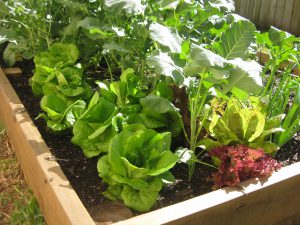My friend from Pennsylvania was surprised to hear that I had just planted a Fall vegetable garden. She had never heard of two season vegetable gardening. In fact, September in Central Florida is a good time to plant many veggies, particularly cruciferous veggies that are somewhat cold tolerant.
With Florida summers getting hotter, the edibles I plant in March such as green beans, tomatoes, and peppers are mostly exhausted by July. So I have learned to rip them all out (including the roots) and cover my garden with clear plastic sheeting during August and early September. This solarization process gives me a clean September planting bed by preventing weeds and driving destructive nematodes into deeper soil.
Vegetable gardening offers fresh air, sunshine, exercise, enjoyment, mental therapy, nutritious fresh vegetables, and financial savings. I have had the best luck with broccoli, cabbages, and collards and less success with cauliflower and Brussels sprouts. Broccoli is especially satisfying since it produces side shoots suitable for salads and stir frying after the main head is harvested. And if you let the broccoli plants go to flower, the good pollinators have something to keep them going during the winter months. Transplants of these veggies are generally available in garden centers in the Fall. Fall is also a good time to sow lettuce and other greens directly into the soil. Plants will not bolt as readily as they do during summer months.
Preparation
 Of course you need to begin your garden by testing soil pH and applying organic material to our sandy Florida soil. UF/IFAS recommend 25-100 lbs. of compost to be worked into the soil for each 100 square feet of garden. You can have your pH tested at the UF/IFAS Extension Marion County Office for $2. Or you can send it to the soils lab at UF: http://soilslab.ifas.ufl.edu/ESTL%20Home.asp. Irrigation will be needed since the winter months are dry. I have had good success with drip irrigation, with some adjustment of watering amount applied.
Of course you need to begin your garden by testing soil pH and applying organic material to our sandy Florida soil. UF/IFAS recommend 25-100 lbs. of compost to be worked into the soil for each 100 square feet of garden. You can have your pH tested at the UF/IFAS Extension Marion County Office for $2. Or you can send it to the soils lab at UF: http://soilslab.ifas.ufl.edu/ESTL%20Home.asp. Irrigation will be needed since the winter months are dry. I have had good success with drip irrigation, with some adjustment of watering amount applied.
With any luck it is possible to enjoy fresh veggies over the holidays. The lower leaves of collards can continue to be harvested well into the spring. For more information on planting times and varieties, go to the Florida Vegetable Gardening Guide: https://edis.ifas.ufl.edu/vh021
Maxine Hunter is the Horticulture Extension Agent and Master Gardener Coordinator at the UF/IFAS Extension Marion County. For more information, contact Maxine maxine32666@ufl.edu, or contact our office at (352) 671-8400. The Extension Service is at 2232 NE Jacksonville Rd. Ocala, FL 34470.
 0
0
